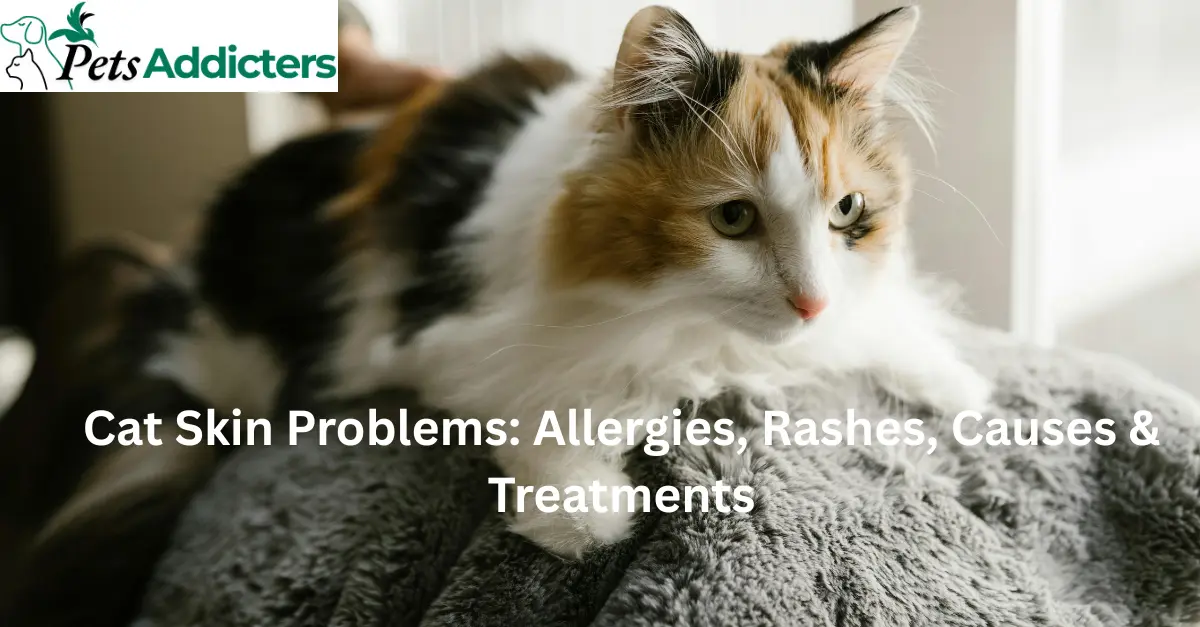Cats are known for their soft, shiny coats, but when skin problems appear, they can quickly become uncomfortable and restless. From constant scratching to visible rashes, skin issues in cats are more common than many pet parents realize. The good news is that with proper care, most conditions can be treated and prevented. In this guide, we’ll explore common cat skin problems, their causes, and treatments every pet owner should know.
Common Signs of Skin Problems in Cats
Skin issues can show up in different ways. Keep an eye out for these warning signs:
- Excessive scratching or licking
- Bald patches or thinning fur
- Red or inflamed skin
- Scabs or sores
- Dry, flaky patches
- Constant head shaking or ear scratching
If you notice any of these, it’s time to pay attention to your cat’s skin health.
1. Allergies in Cat
Just like humans, cats can develop allergies that affect their skin. Common triggers include:
- Food allergies – Certain proteins like chicken, beef, or dairy may cause skin irritation.
- Environmental allergies – Pollen, dust mites, and mold can trigger itching and redness.
- Flea allergy dermatitis – A single flea bite can cause an intense allergic reaction in some cats.
Treatment:
- Eliminate the allergen (switch food, use flea preventives, or reduce environmental triggers).
- Medications like antihistamines or steroids may be prescribed by your vet.
- Hypoallergenic cat food can help if food is the cause.
2. Cat Skin Rashes
Rashes may appear as red, inflamed patches or bumps on your cat’s skin. They can be caused by insect bites, fungal infections, or contact with irritating substances like cleaning products.
Treatment:
- Gently clean the affected area with vet-approved wipes.
- Use medicated shampoos recommended by your vet.
- Avoid exposing your cat to harsh chemicals or unsafe plants.
3. Parasite-Related Skin Problems
Fleas, ticks, and mites are among the most common culprits of cat skin irritation. They not only cause itching but can also lead to infections and hair loss.
Treatment:
- Regular flea and tick prevention (topical or oral).
- Veterinary treatment for mites and lice.
- Keeping bedding and living spaces clean.
4. Fungal and Bacterial Infection
Ringworm (a fungal infection) and bacterial infections can cause scaly patches, sores, or crusty skin. These conditions are often contagious to humans and other pets.
Treatment:
- Antifungal creams, shampoos, or oral medications.
- Antibiotics for bacterial infections.
- Quarantining your cat if ringworm is diagnosed.
Preventing Cat Skin Problems
Prevention is always better than cure. Here’s how you can reduce the risk:
- Provide a balanced diet with essential fatty acids for healthy skin and coat.
- Keep your cat’s environment clean and flea-free.
- Regular grooming to spot issues early.
- Schedule routine vet checkups for early diagnosis.
Final Thoughts
Cat skin problems like allergies, rashes, and infections can be uncomfortable for your feline friend, but with the right care, most issues are treatable. Pay attention to early signs, consult your veterinarian, and take preventive steps to keep your cat’s skin healthy.
A happy cat is one with soft, itch-free skin and as a pet parent, you play the biggest role in making that happen.
What are the most common cat skin problems?
The most common cat skin issues include allergies, flea dermatitis, fungal infections like ringworm, bacterial infections, and rashes caused by irritants.
How do I know if my cat has a skin allergy?
Signs of skin allergies in cats include constant scratching, licking, red patches, hair loss, scabs, and restlessness. A vet can perform tests to confirm.
Can food allergies cause skin problems in cats?
Yes. Cats with food allergies often develop itchy skin, rashes, and digestive issues. Switching to hypoallergenic or special diets can help.
Are cat skin rashes dangerous?
Most rashes are not life-threatening but can cause discomfort and lead to infections if untreated. Some conditions like ringworm can spread to humans
How do vets treat cat skin problems?
Treatment depends on the cause. Vets may prescribe antifungal or antibacterial medications, medicated shampoos, flea preventives, or dietary changes.

